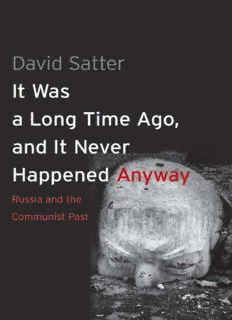
Russia and the Communist Past PDF
Preview Russia and the Communist Past
IT WAS A LONG TIME AGO, AND IT NEVER HAPPENED ANYWAY 2 It Was a Long Time Ago, and It Never Happened Anyway Russia and the Communist Past David Satter Yale UNIVERSITY PRESS New Haven & London 3 Copyright © 2012 by David Satter. All rights reserved. This book may not be reproduced, in whole or in part, including illustrations, in any form (beyond that copying permitted by Sections 107 and 108 of the U.S. Copyright Law and except by reviewers for the public press), without written permission from the publishers. Yale University Press books may be purchased in quantity for educational, business, or promotional use. For information, please e-mail [email protected] (U.S. office) or [email protected] (U.K. office). Set in Galliard Oldstyle type by Keystone Typesetting, Inc. Printed in the United States of America. Library of Congress Cataloging-in-Publication Data Satter, David, 1947- It was a long time ago, and it never happened anyway : Russia and the communist past / David Satter. p. cm. Includes bibliographical references and index. ISBN 978-0-300-11145-3 (cloth : alk. paper) 1. Soviet Union — History —1925-1953. 2. Atrocities — Soviet Union — History. 3. Atrocities — Soviet Union — Public opinion. 4. Communism — Soviet Union—History. 5. Communism—Soviet Union—Public opinion. 6. Public opinion — Russia (Federation) 7. Kommunisticheskaia partiia Sovetskogo Soiuza— History. 8. Soviet Union. Narodnyi komissariat vnutrennikh del—History. 9. Soviet Union. Komitet gosudarstvennoi bezopasnosti — History. 10. Stalin, Joseph, 1879-1953. I. Title. DK267.S24 2012 947.084’2 — dc23 2011022685 A catalogue record for this book is available from the British Library. This paper meets the requirements of ANSI/NISO Z 39.48-1992 (Permanence of Paper). 10 9 8 7 6 5 4 3 2 1 4 For Raphael, Claire, and Mark 5 I would have wanted to recall them all by name But they took the list and there’s nowhere to find it —Anna Akhmatova, “Requiem” (translation by the author) 6 CONTENTS Acknowledgments List of Abbreviations and Administrative Delineations Introduction CHAPTER 1 The Statue of Dzerzhinsky CHAPTER 2 Efforts to Remember CHAPTER 3 Butovo and Kommunarka CHAPTER 4 St. Petersburg CHAPTER 5 The Appeal of Communism CHAPTER 6 The Responsibility of the State CHAPTER 7 The Trial of the Communist Party CHAPTER 8 Moral Choice under Totalitarianism CHAPTER 9 The Roots of the Communist Idea CHAPTER 10 Symbols of the Past CHAPTER 11 History CHAPTER 12 The Shadow of Katyn CHAPTER 13 Vorkuta 7 CHAPTER 14 The Odyssey of Andrei Poleshchuk Conclusion Notes Bibliography Index 8 ACKNOWLEDGMENTS I owe a debt of gratitude to a number of institutions that provided me with support: the Sarah Scaife Foundation, the Smith Richardson Foundation, the Kathryn W. Davis Foundation (now the Diana Davis Spencer Foundation), the William H. Donner Foundation, and the Earhart Foundation. In addition, I received support from the Hoover Institution, where I was a research fellow from 2003 to 2008. I would like to express my personal thanks to Daniel McMichael, Michael Gleba, Nadia Schadlow, Marin Strmeki, Diana Davis Spencer, Abby Moffat, Curt Winsor, Ingrid Gregg, and John Raisian. This book could not have been written without this timely and generous assistance. I am currently affiliated with the Hudson Institute and the Johns Hopkins University School of Advanced International Studies (SAIS). I would like to thank Kenneth Weinstein, the president of Hudson, and Amir Pasic, the director of the Foreign Policy Institute at SAIS, for their encouragement and help. In Moscow I benefited greatly from the assistance of the Memorial Society, in particular Arseny Roginsky, Yelena Zhemkova, Irina Flige, Boris Belenkin, Alexander Daniel, Leonid Novak, Nikitia Petrov, Alexei Korotaev, and Marina Grant. The staff of the Slavic Reference Service at the University of Illinois, Urbana-Champaign, helped me to find needed materials both when I was a visiting professor at the university in 2008 and after my return to Washington. I am also grateful to the research staff of the Hoover Institution Archives for their help. Andrew Nagorski, Gershon Braun, my sister Beryl Satter, and my sons Raphael and Mark read early versions of the manuscript and provided helpful suggestions and comments. Olga Printseva took time from a busy schedule to help me with the bibliography and notes. 9 ABBREVIATIONS AND ADMINISTRATIVE DELINEATIONS All Russian Extraordinary Commission for Combating Cheka Counter Revolution and Sabotage FSB Federal Security Service GAI State Automobile Inspection State Inspectorate for the Security of Automobile GIBDD Traffic, successor in 1988 to GAI KGB Committee for State Security MChS Ministry for Extraordinary Situations MVD Ministry of Internal Affairs NKVD People’s Commissariat of Internal Affairs Joint State Political Directorate, successor to the OGPU Cheka Russian Soviet Federative Socialist Republic, the RSFSR Russian “republic” of the Soviet Union SVR Foreign Intelligence Service Council of People’s Commissars, the first Soviet Sovnarkom government Voenkomat Military Commissariat Best translated as “province” or “territory,” a krai is a territorial subdivision that generally encompasses a Krai large area, such as Primoriye in the Far East or the Krasnoyarsk region in Siberia. Often similar in size to an American state, an oblast is a territorial subdivision of the Russian Federation. Since 2004 the governors of oblasts, as well as the Oblast mayors of Moscow and St. Petersburg, which are also considered “subjects of the federation,” have been appointed by the president. A raion is a subdivision of an oblast or city and is responsible for most local administration, including Raion 10
Description: